Leslie B. Hammer Lab
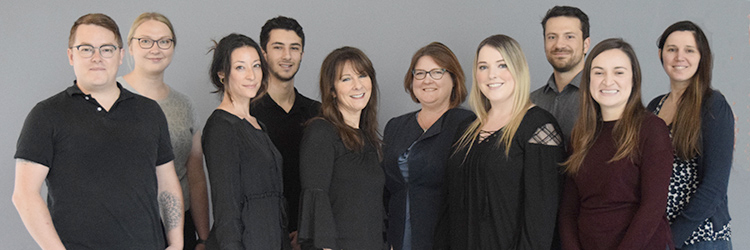
Shalene Allen, Luke Mahoney, MacKenna Perry, Jacquelyn Brady (June 2018)
Research interests
Dr. Leslie B. Hammer specializes in the effects of workplace conditions, including supportive supervision at work and occupational stress, on workplace mental health and well-being. She is the Associate Director of Applied Research and Professor in the Oregon Institute of Occupational Health Sciences at Oregon Health & Science University and the Co-Director of the Oregon Healthy Workforce Center, one of 10 centers of excellence in Total Worker Health® funded by the National Institute of Occupational Safety and Health.
She is also Professor Emerita at Portland State University. Dr. Hammer has extensive experience in designing, implementing, and evaluating worksite supervisor training programs to improve employee mental health and well-being outcomes. She conducts applied research that focuses on workplace interventions aimed at improving supervisor leadership skills and in turn, evaluating the impact of such trainings on both supervisor and worker mental and physical health, safety, and well-being. She has been Principal Investigator of 5 large workplace intervention randomized controlled trials evaluating the effectiveness of supervisor support training funded by the NIH, CDC/NIOSH, and the DoD.
She is a Fellow of the American Psychological Association, the Society for Industrial and Organizational Psychology, and the European Academy of Occupational Health Psychology. She is also the Founding President of the Society for Occupational Health Psychology. She co-wrote a book entitled Working Couples Caring for Children and Aging Parents (2008), and publishes widely in such outlets as the Journal of Applied Psychology, Journal of Occupational Health Psychology, and Journal of Environmental and Occupational Medicine.
Go to Dr. Hammer's faculty page
See Dr. Hammer's publications on Google Scholar
Go to Supportive Workplaces
Current research projects
Evaluation of Oregon Overtime Pay Legislation Among Latinx Agricultural Workers and Their Families
Oregon’s HB-4002 legislation, passed in 2022 with a 5-year phased in implementation starting in January 2023, extends overtime pay protections to agricultural workers, a sector historically exempt from such benefits. This study will investigate how the new law affects Latinx agricultural workers, with a focus on financial security, health, and family well-being. By examining potential benefits like improved health outcomes and increased income, as well as challenges like job insecurity or fear of retaliation, the research seeks to offer policymakers a nuanced perspective on the effectiveness and limitations of overtime protections within immigrant and low-wage labor communities.
Oregon Healthy Workforce Center
Dr. Hammer is the Co-Director of the Oregon Healthy Workforce Center, one of ten Total Worker Health® Centers of Excellence funded by the National Institute for Occupational Safety and Health (NIOSH). Research at the OHWC focuses on effective interventions that aim to improve the health, safety, and wellness of workers. Read more about the Oregon Healthy Workforce here
Department of Defense Projects
The next three research projects in this section were all funded by the Department of Defense, starting in 2013 to the present. Dr. Hammer and her team built on the Family Supportive Supervisor Behavior training, created with Dr. Ellen Kossek, and adapted the content for specific types of supervisor support in various military settings. Each project used a rigorous study design, a randomized controlled trial, and focused on employee outcomes of health and well-being, as well as organizational effects. We partnered with Drs. Cynthia Mohr and Todd Bodner at Portland State University.
Each project has its own study website which you can find by clicking on the hyperlinked title.

Readiness Supportive Training for Leaders (RESULT): 2018 – 2023
RESULT involved the development and evaluation the effectiveness of our Readiness Supportive Leadership Training (RESULT) with active duty U.S. Army soldiers. The training program has had a positive impact on service member readiness and resilience, psychological health, team cohesion, and reduced loneliness. This research was designed to benefit not only U.S. Army soldiers, but service members across all military branches, as well as first-responders and other civilian occupations that face highly stressful situations as part of their work. Read more about the project on the Oregon and the Workplace blog.
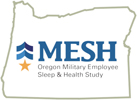
The Oregon Military Employee Sleep and Health Study (MESH): 2016-2022
The MESH Study addressed the issue of sleep-related health concerns that are increasingly the focus of research in the military, as well as in the civilian sector. The adverse effects of sleep deprivation are known to cause a variety of negative health and family issues. We partnered with the Oregon National Guard to conduct this study.
We created a Family and Sleep Supportive Training for ORNG leaders and also gave individual sleep feedback to participants. Findings thus far show the MESH Training has a positive impact on sleep health, general well-being and improved work outcomes, such as higher job satisfaction and safety behaviors, as well we reduced turnover intentions. Even though they were not directly involved in the training, spouses and partners also benefited with improved couple and individual well-being effects. For more detail on these findings, as well as to experience the training program, please visit the MESH Study website.
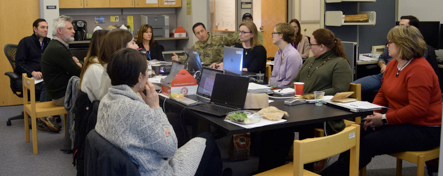
Directorate-West, and his team in Leslie’s lab. http://usamrd-w.amedd.army.mil/
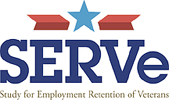
Study for Employment Retention of Veterans (SERVe): 2013-2018
SERVe aimed to improve the health and well-being of service members and their families by targeting the workplace experiences of Veterans and Service Members recently transitioned to the civilian workforce. For the SERVe Study, Dr. Hammer and her team created an online training for supervisors of veteran employees to improve the knowledge and skills of supervisors with service members in their employ to foster a supportive workplace environment.
The SERVe training and behavior tracking programs are available at the SERVe website, along with summaries of research findings.
Past Research Projects
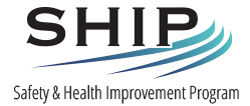
The Safety & Health Improvement Program (SHIP) was designed to increase supervisor and peer support and decrease job strain, which play a key role in safety compliance and improved physical and mental health. SHIP integrates a focus on both health protection and health promotion by addressing psycho-social factors that are shown to be related to safety, well-being, and organizational productivity.
The SHIP intervention study was a NIOSH-funded randomized controlled trial focusing on supervisors and their teams. SHIP aimed to increase employee support from supervisors, improve team communication, enhance team effectiveness, and reduce stress and work-family conflict.
The SHIP intervention was composed of:
- One-hour training for supervisors
- Behavior-tracking that reinforced the training principles
- Team-based planning and problem-solving that utilizes a modified version of WFD Consulting's Team Effectiveness Process
- Follow-up sessions
SHIP has been systematically revised to apply across a wide variety of industries and organizations. The revised SHIP training is now available to implement in your organization.
See our most recent abstract.
The Sandwiched Generation
Along with her colleague Dr. Margaret B. Neal, Dr. Hammer researched the modern phenomenon of working couples who care for both children and aging parents and coined them the "Sandwiched Generation". Her research still guides evidence-based practices aimed at improving the health and well-being of these couples.
Work, Family & Health Network (WFHN)
The Work, Family & Health Network (WFHN) is comprised of an interdisciplinary team of researchers brought together by The National Institutes of Health and the Centers for Disease Control and Prevention to advance the field of workplace psychosocial interventions in order to improve the health of workers and their families, while benefiting employers. Read more about The Work, Family & Health Network (WFHN) here.
My research team

Krista Brockwood-Staff Scientist
Dr. Brockwood is a Staff Scientist at OHSU since 2015, but prior to that was at Portland State University (PSU) overseeing two major federally-funded grants with Dr.Leslie Hammer. Dr. Brockwood received her Ph.D. in Industrial/Organizational Psychology & Systems Science from PSU in 2002. She was an Assistant Professor at Pacific University in the School of Professional Psychology from 2003-2008. Dr. Brockwood is a Veteran having served in the U.S. Army from 1988-1992 in Military Intelligence as a Signals Specialist/Cryptologic Linguist.

Phoenix Rain Bird-Senior Research Assistant
Ms. Rain Bird began working with Dr. Hammer in 2012 as an undergraduate research assistant through the Work-Family Health Network. After graduating with honors from Portland State University in 2013, she joined the SERVe project as a full-time research assistant and continues her work as a research coordinator on the MESH study. Ms. Rain Bird is primarily responsible for managing the data collection, tracking, and incentives for MESH and development and graphic design of the training programs.

Shalene Allen-Senior Research Assistant
Ms. Allen graduated from Portland State University in August 2014 with her Bachelor of Science degree in Psychology. She joined Dr. Leslie Hammer's lab in November 2017 working on the Oregon MESH study. Ms. Allen is primarily responsible for managing recruitment activities and coordinating fieldwork. Her research goals include improving total worker health, well-being, and safety through varied occupational health interventions.

Luke Mahoney-Graduate Research Assistant
Luke became a member of Dr. Hammer's research team in June 2016. He spent five years in the Marine Corps before beginning his undergraduate studies. He recently graduated from Portland State University with a B. S. in Psychology and is now pursuing a Ph.D. in Industrial/Organizational Psychology. His main tasks include assisting with SERVe data management and analysis and the development of the training for the Oregon MESH Study.